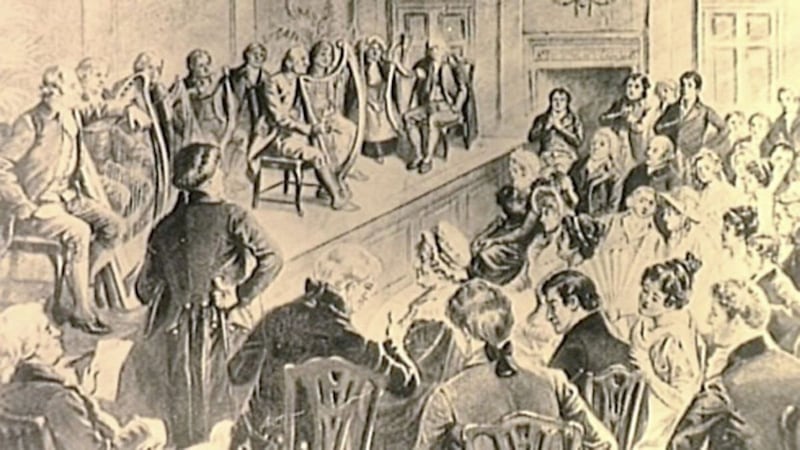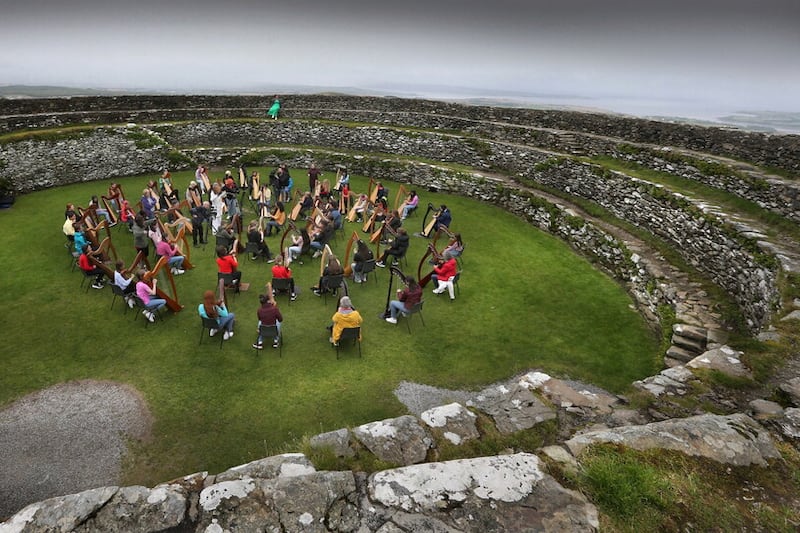DID you know Ireland is the only country that has a musical instrument as its national symbol?
From official documents to Guinness pint glasses and Ryanair planes, the harp is dotted throughout various aspects of society, intricately intertwined with notions of Irish identity.
However, there was a time when the harping tradition risked being lost altogether.
In 1531 King Henry VIII declared himself King of Ireland and although the harp was appointed as the official emblem of the realm, over time it instead became a symbol of resistance.
This led to Queen Elizabeth declaring in 1603 that all Irish harpers should be hung and their instruments burned.
The Belfast Harp Festival of 1792 attempted to keep the flagging tradition alive. Edward Bunting, a young organist from Co Armagh, was hired to transcribe all the music played - as Irish harp is traditionally learned by ear rather than played from sheet music.
Bunting continued this endeavour throughout his life and his collection of documented traditional tunes has become famous.

More than 230 years later, harpists and historians from all over Ireland have been joining forces in Belfast for the Harps Alive festival, with more events scheduled for Dublin and Drogheda in September.
Organised by Cruit Éireann (Harp Ireland) and historical organisation Reclaim the Enlightenment, the initiative celebrates the 1792 gathering and its importance in preserving and influencing Irish harp music.
“The event in 1792 was really a catalyst for transcribing and preserving our harp music so without it none of this may have existed,” explains CEO of Cruit Éireann Lauren O’Neill.
“This is the third year of Harps Alive and really what we’ve been trying to do is commemorate and celebrate Belfast’s close connection to our harping tradition.”
As part of the celebrations, this year’s programme includes harp concerts as well as a series of recitals, talks and workshops shining a contemporary spotlight on harping.
A Belfast concert in St George’s Church on High Street was “particularly apt because Edward Bunting was the organist there”, explains Lauren.

A number of Scottish-based musicians are involved, too, “in order to celebrate and reflect our close connections to Scotland in terms of harping,” Lauren adds.
Although the harping tradition is 1,000 years old, she explains that there has been, “a serious revival and resurgence in the last 50 years”.
“There’s a number of harp schools right across Ireland but particularly in the north with lots of young people learning the harp,” says Lauren.
“Festivals are an opportunity for them to meet other harpists and watch or participate in different activities like our workshops and pop-up performances.
“But we’re also really eager to open access to harping. We want to give others who maybe haven’t played or even heard a harp before an opportunity to experience the tradition.”
One event that may be of interest to harping novices is the Try Your Hand at the Early Irish Harp Workshop with Aoibheann Devlin which will take place in the Linenhall Library on June 15.
“You don’t have to have any experience in harping,” Lauren clarifies.
“But you’ll get to try out that early Irish harp with the wire strings that would’ve been played in Belfast during the 1792 festival, so you get to experience a little piece of history and tradition.”
She also assures me that it will not hurt your fingers.
“They grow used to it,” she laughs.
“The early Irish harp would’ve been played with the fingernails but that tradition kind of evolved so now we pluck the strings with our finger pads.
“But generally, your fingers build up a resilience so that it’s not sore.”
In addition to celebrating the history of harping there is also a focus on cross-community collaboration as Harps Alive aims to bring people from all cultures and backgrounds together.
“For the past number of years, we’ve been very fortunate to receive funding from the Co-operation with Northern Ireland Scheme,” which is a programme that promotes interaction and dialogue between the peoples of Northern Ireland, Lauren explains.
“We’ve also partnered with Reclaim the Enlightenment and we really worked together to piece together the programme for the festival and bring it to venues right across Belfast city.
“We’ve also been to six primary schools to tell them a little bit more about the harp and let the younger generation try it out.”
Events will take place in Belfast over the weekend of June 14/15 before moving to Drogheda in September to mark the town’s “grand harp concert” of 1844.
“We’ll be going to Drogheda and then Dublin as well, so we have real mixture of events over the coming the months.
“The harp has a real ability to cross borders and boundaries, it’s a really special instrument because it has got such a rich history right across Ireland.
“It’s something we should all celebrate and Harps Alive lets us do that.”








